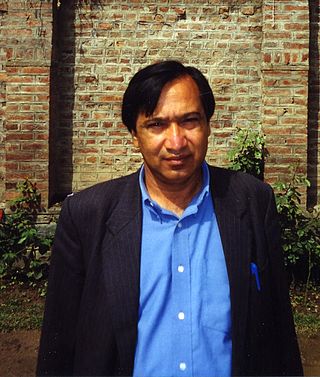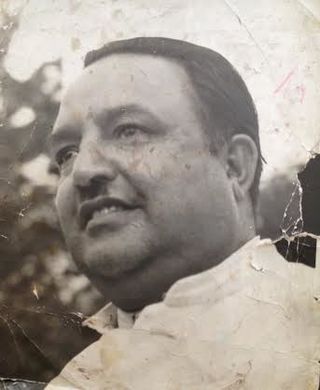Related Research Articles

The Jammu and Kashmir National Conference (JKNC) is a regional political party in Indian-administered Kashmir's union territories of Jammu and Kashmir and Ladakh. Founded as the All Jammu and Kashmir Muslim Conference by Sheikh Abdullah and Chaudhry Ghulam Abbas in 1932 in the princely state of Jammu and Kashmir, the organisation renamed itself to National Conference in 1939 in order to represent all the people of the state. It supported the accession of the princely state to India in 1947. Prior to that, in 1941, a group led by Ghulam Abbas broke off from the National Conference and revived the old Muslim Conference. The revived Muslim Conference supported the accession of the princely state to Pakistan and led the movement for Azad Kashmir.

Ghulam Nabi Azad is an Indian politician who served as Leader of Opposition in Rajya Sabha between 2014 and 2021. He also served as the Chief Minister of erstwhile state of Jammu and Kashmir from 2005 to 2008. On 26 September 2022, Azad announced his own political party as Democratic Progressive Azad Party. He is the chief patron cum founder of Democratic Progressive Azad Party.

Dr. Farooq Abdullah (born 21 October 1937) is an Indian politician and the current president of the Jammu & Kashmir National Conference. He has served as the chief minister of Jammu and Kashmir on several occasions since 1982, and as the union minister for New and Renewable Energy between 2009 and 2014. He is the son of the 1st elected chief minister of Jammu and Kashmir Sheikh Abdullah. His son is the current chief minister of Jammu and Kashmir Omar Abdullah.

Omar Abdullah is an Indian politician who is currently serving as the chief minister of the union territory of Jammu and Kashmir. He had previously served as the chief minister of the state of Jammu and Kashmir between 2009 and 2014, and is the current vice president of the Jammu and Kashmir National Conference (JKNC), a position he has held since 2009. Abdullah also served as a member of parliament in the Lok Sabha from 1998 to 2009, representing the Srinagar parliamentary constituency, and was a union minister of State for External Affairs.
In 1989, Rubaiya Sayeed, the daughter of the then Indian Home Minister Mufti Mohammad Sayeed, was kidnapped by Kashmiri separatist militants in Srinagar, the capital of Jammu and Kashmir. The kidnappers demanded the release of five jailed members of Jammu Kashmir Liberation Front (JKLF) in exchange for Sayeed's release. The Indian government headed by V. P. Singh of the Janata Dal party, with outside support from the BJP, agreed to the demands and induced the state government to release the jailed militants. In 2004, the JKLF admitted to having carried out the kidnapping, and the court case is ongoing. In July 2022, Rubaiya identified Yasin Malik, one of the key leaders of JKLF at that time, as one of her kidnappers.

Mohammed Yousuf Tarigami is an Indian politician from Jammu and Kashmir. He belongs to the Communist Party of India (Marxist) and is a member of the Jammu and Kashmir Legislative Assembly, to which he has been elected five times consecutively since 1996, representing the Kulgam Assembly Constituency.

Mirza Afzal Beg, also known as Fakhr-e-Kashmir was a Kashmiri politician and the founding member of Jammu & Kashmir National Conference. He was the first Deputy Chief Minister of Jammu and Kashmir. He was member of the Constituent Assembly of India. He served as a minister in the pre-independence period in the princely state of Jammu and Kashmir, and as the revenue minister in the post-independence government headed by Sheikh Abdullah. In this post he led the land reforms in Jammu and Kashmir, recognised as the most successful land reforms in India.

Jammu and Kashmir Cricket Association (JKCA) is an organisation that governs and manages cricket in the Indian union territory of Jammu and Kashmir. It fields the Jammu and Kashmir cricket team in the Ranji Trophy domestic tournament. It is a member of the Board of Control for Cricket in India.
Shameema Dev Azad is an Indian singer from Jammu and Kashmir. She is married to Ghulam Nabi Azad, former Chief Minister of Jammu and Kashmir.
Elections for the former Indian state of Jammu and Kashmir were held in September -October 2002 in four phases.

Aijaz Ahmad Khan popularly known as Sher-e-Gool Gulabgarh is an Indian politician and was a member of the 10th, 11th and 12th Jammu and Kashmir Legislative Assembly from Gool Arnas constituency. He served as Minister of various portfolios from 2002 to 2014 in Jammu and Kashmir Govt under the Chief Ministership of Mufti Mohammad Sayeed, Ghulam Nabi Azad and Omar Abdullah. He also served as Deputy Leader of Congress Legislative Party from 2014 to 2018 He left Congress and became founding member of Jammu and Kashmir Apni Party (JKAP) formed on 8 March 2020.He was also the Vice President of PAC and member CWC of Jammu and Kashmir Apni Party. Prior to Assembly Elections in Jammu and Kashmir, Khan left Apni Party and decided to contest elections as Independent from Gulabgarh constituency.
Syed Mohammad Altaf Bukhari is an Indian politician hailing from Jammu and Kashmir. He is the president of the Jammu and Kashmir Apni Party, a political organization, which he launched in 2020. He served as the member of Jammu and Kashmir Legislative Assembly from 2015 to 2018, representing the Amira Kadal Assembly constituency. He served as the education minister of Jammu and Kashmir and later assumed the additional responsibility of the Finance, Labour and Employment ministry.
Sidhra is a town and municipality in the city of Jammu in the Indian Union Territory of Jammu and Kashmir.

Ghulam Mohammad Saroori, also known as G. M. Saroori, is an Indian politician and a former legislator of Jammu and Kashmir Legislative Assembly, who represented Inderwal constituency of Kishtwar district from 2002 to 2018 until the coalition government was ended in the state of Jammu and Kashmir.

Elections to the Jammu and Kashmir Legislative Assembly was held in Indian-administered Jammu and Kashmir from 18 September to 1 October 2024 in 3 phases to elect its 90 members. The results of the elections were announced on 8 October 2024. The INDIA alliance, consisting of the Jammu and Kashmir National Conference (JKNC), the Indian National Congress (INC) and the Communist Party of India (Marxist), won a majority of seats in the election, winning 49 of the 90 seats for which elections were held, with the JKNC winning the highest number of seats. The Bharatiya Janata Party (BJP) won the largest share of the popular vote.
Sajjad Ahmed Kichloo is an Indian politician and former member of the Jammu and Kashmir Legislative Assembly who served as a State Home minister in the first Omar Abdullah ministry in 2009. A member of the Jammu and Kashmir National Conference, he was elected as a member of legislative assembly during the 2002 and the 2008 legislative assembly elections from Kishtwar constituency. He also served as a member of the Legislative Council in 2015, representing Kishtwar district.
Roshni Act controversy, also referred to as Roshni Act scam or Roshni land scam, is an alleged scam in the Indian union territory of Jammu and Kashmir, involving the illegal transfer of 20,46,436 kanals of state land, valued at approximately ₹25,000 crore to 400 beneficiaries, whose legal status or claims remain contested, under the now-repealed Roshni Act. The scam includes allegations of political corruption, favoritism, and illegal land transfers made under the Act.
Ghulam Mohi-ud-Din Malik was an Indian politician and advocate, known for his role as the speaker of the Jammu and Kashmir Legislative Assembly from 1977 to 1981. He was a member of the Jammu and Kashmir National Conference (NC).
References
- 1 2 3 M, Rahul (14 October 2020). "Explainer: What's the controversial Roshni Act all about and why has J&K HC ordered a CBI probe into it?". Yahoo News.
- 1 2 Sharma, Arun (2018-12-03). "Explained: J&K Roshni Act: what it aimed to do, what happened until it was repealed". The Indian Express. Retrieved 2020-11-02.
- ↑ Chauhan, Abha (2017-08-28). "7: Gendering the Landownership Question in Jammu and Kashmir". In Chowdhry, Prem (ed.). Understanding Women's Land Rights: Gender Discrimination in Ownership. SAGE Publishing India. ISBN 978-93-86446-33-6.
- 1 2 "J&K administration scraps Roshni Act, says government will retrieve land in six months". Scroll.in. 1 November 2020. Retrieved 2020-11-03.
- 1 2 Sharma, Arun (14 October 2020). "'Loot to own': J&K High Court hands Rs 25,000 crore land scam probe to CBI". Indian Express.
- ↑ Ashiq, Peerzada (2020-10-31). "J&K government declares Roshni Act 'null and void'". The Hindu. ISSN 0971-751X . Retrieved 2020-11-02.
- ↑ "J&K govt declares actions under Roshni Act 'null and void'; what you need to know". Firstpost. 2020-11-02. Retrieved 2020-11-02.
- ↑ "J&K admin working on details of beneficiaries of alleged Roshni Act scam". Deccan Herald. 22 October 2020.
- ↑ Bhatt, Sunil (24 November 2020). "Farooq Abdullah's name surfaces in Roshni land scam, says it's only a ploy to disturb him". India Today.
- ↑ Indian Defence Review Volume 18. Lancer International. 2003. p. 13. Retrieved 3 November 2020.
- ↑ "What is J&K's Roshni Act and how it enabled land 'loot' in the name of light". ThePrint. 2020-11-02. Retrieved 2020-11-03.